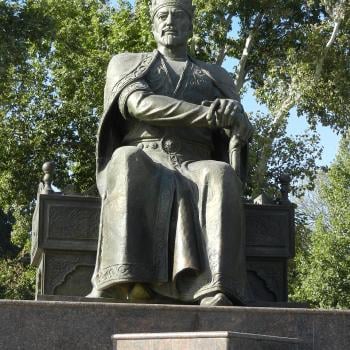
My adopted home state is taking a starring role in a new set of films. If you can access these — I know that you can access the third one but I’m less certain about the first two — I think that you’ll find them interesting:
National Review: “Horizon Is Costner’s Daring Love Letter to the American West”

I wrote here the other day about the death of our friend Thomas F. Rogers. (See “A Full Life.”) Here are some good pieces that I’ve noticed about him since his passing:
- Although Tom has been a presence in both of our lives for five decades in my case and even longer in hers, my wife and I learned several things from his excellently written obituary that we had not known before. (Amazingly, I learned today that Tom had given more than 2660 patriarchal blessings, some to his family but most across Eastern Europe.)
- See also Andrew Hall’s “Thomas F. Rogers, A literary obituary,” on the website for the Association for Mormon Letters.
- And Peggy Fletcher Stack wrote an interesting article for the Salt Lake Tribune: “Thomas Rogers, a giant in Latter-day Saint arts and letters, dies: Rogers was a noted playwright and scholar who dedicated his life and work to serving far-flung members of The Church of Jesus Christ of Latter-day Saints — in an unconventional way.”
My wife and I attended Tom’s funeral today, though, and we know from personal acquaintance that the tributes paid to him there by friends, former colleagues, and children were richly deserved. I expect that Tom’s ticket will take him all the way.
So, as always happens when I attend the funeral of a genuinely good person, I left the chapel at the end of Tom’s service humbled and reflective, awed by the life that he led and all that he accomplished, aware of the many ways in which I have failed to measure up to what I ought to be, and yet not beaten down and depressed but, rather, inspired.
I would like to share with you a few notes that I jotted down during the funeral service, regarding things that struck me.
The funeral began with the hymn “Each Life That Touches Us for Good,” which is a favorite of mine that well expresses my feeling for the growing number of friends that I’ve lost.
The speakers included Tom’s former student Daniel Austin, his former colleague Don Jarvis, and his friends Terryl Givens and Bob Rees, After a musical number, all seven of his children — two sons and five daughters — offered movingly respectful and loving reminiscences.
A daughter told of having the words “Well done, thou good and faithful servant” (Matthew 25:21) come powerfully into her mind when her father died. Interestingly, another daughter says that he was promised in his own patriarchal blessing that, if faithful, he would hear those very words when his life ended.
One daughter related that her mother, Merriam (Tom’s wife, who died on 12 September 2022) had appeared to her in a dream back in March, telling her that she would soon be coming to get Tom. Apparently, his final illness began shortly thereafter.
Tom evidently spent much of his last week sleeping. Once, he suddenly woke up and told one of his daughters, “At the funeral, tell them ‘Do go gently into that good night!'”
In his sleepy, perhaps semi-comatose state, he occasionally made interesting statements that one of his neighbors wrote down. “I want to go home,” he said at one point. “This is paradise!” he said at another. Once, he touched his hand to his lips, kissed it, and then extended his arm toward the opposite wall. “Merriam,” he said, “my one true love.”
I was happy to hear one of the children quote a favorite passage from an April 1992 conference address by Elder Russell Russell M. Nelson, who was a member of the Quorum of the Twelve Apostles at the time. I cite here slightly more than was actually quoted in the funeral:
The only way to take sorrow out of death is to take love out of life. . . .
Life does not begin with birth, nor does it end with death. Prior to our birth, we dwelled as spirit children with our Father in Heaven. There we eagerly anticipated the possibility of coming to earth and obtaining a physical body. Knowingly we wanted the risks of mortality, which would allow the exercise of agency and accountability. “This life [was to become] a probationary state; a time to prepare to meet God.” (Alma 12:24.) But we regarded the returning home as the best part of that long-awaited trip, just as we do now. Before embarking on any journey, we like to have some assurance of a round-trip ticket. Returning from earth to life in our heavenly home requires passage through—and not around—the doors of death. We were born to die, and we die to live. (See 2 Cor. 6:9.) As seedlings of God, we barely blossom on earth; we fully flower in heaven.
On a humorous note, I absolutely loved a story told by one of the daughters: She came into one of her classrooms on the first day of a new semester and was surprised to see her father gathering his books and papers after a class that he had taught in that very room during the previous hour. She wasn’t sure that he had noticed her. He continued to gather things up, erase the board, and so forth, until most of the next class had arrived. At that point, he looked up and addressed the new class. “I have a traditional practice on the first day of a new semester,” he said. “I look over the class, pick out the prettiest girl in it, and kiss her.” Whereupon, he walked over to his daughter (without indicating their relationship), planted a big kiss on her, and then, without comment, left the classroom. The students gasped; several, no doubt, were already planning to report him. At which point, of course, she explained to them that he was her father. That was years ago; today, I rather expect that he would be immediately lynched.
I plainly need to revisit Tom’s essay “We Are All Potentially Glorious,” which was mentioned more than once during the funeral. (I believe that it’s included in the 2016 anthology of his essays Let Your Hearts and Minds Expand: Reflections on Faith, Reason, Charity and Beauty). I’m also pleased to say that Tom’s final work, a novel entitled Desperate Measures that is based on the lives of several of his ancestors, is scheduled for publication in August. I look forward to it. It will, I expect, be controversial.












